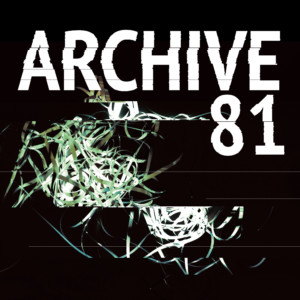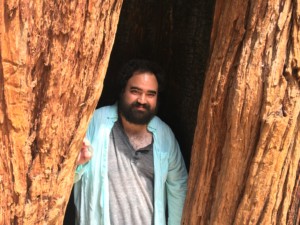First released in 2016, Archive 81 is a found footage horror podcast co-created by Dan Powell and Marc Sollinger. The plot follows Dan Turner, an archivist who restores damaged videotapes. The job pulls him into a peculiar, cultish world where he comes across a documentary filmmaker named Melody Pendras. The rising action takes place in a savory, tension-filled atmosphere that led to the podcast garnering a wide audience.

After three successful seasons, Netflix called. On January 14, 2022, a loose adaptation of the first season hits screens as a series from executive producer James Wan, creator of horror franchises Saw and The Conjuring.
It’s an exciting time for Powell and Sollinger, and the series will undoubtedly attract new podcast listeners, but Archive 81 isn’t just about the Hollywood homerun, it’s a story of finding inspiration and imagination from things close at hand–the sort of creative stimulus that doesn’t require deep cuts from any previous literary canon to conjure a unique tale of horror.
Two Friends and a Thesis

Long before Archive 81, Sollinger and Powell were university students with an affinity for sound and storytelling. “In college, I became really involved with radio and audio,” says Sollinger, whose thesis was a science fiction audio drama called Transmission about an astronaut who crash lands on a mysterious planet.
Powell was interested in the underlying nuts and bolts of audio engineering. He took an elective in recording and learned GarageBand during his free time. Understanding how audio is recorded, mixed, and mastered influenced how he viewed audio as a creative vehicle.
A mutual professor, Douglas Quinn, introduced the two, believing that their creative interests would gel. Sollinger offered Powell the lead role, and the radio drama became their first official collaboration. It turned out to be a great experience, and Sollinger was awarded a grant that fueled Transmission’s production. He was even able to cast well-known children’s author Bruce Coville.
Their creative collaboration on Transmission laid the foundation for their eventual work on Archive 81.
Found Footage
After they graduated, Sollinger moved to Boston and Powell to New York City, but they kept in touch hoping to find more opportunities for collaboration. “I was working for a sound effects library and my job was literally sitting alone in my apartment, listening to huge collections of sound effects, and cataloguing them,” says Powell. Those long hours alone sifting through countless audio samples became the impetus for their next project.

“You’re listening to sounds all the time,” Powell says. The line between reality and fiction can blur in an aural onslaught. While Powell was working, the pair were chatting and brainstorming remotely, “…half of [what blossomed into Archive 81] came from the experience of cataloguing sounds.”
Sollinger remembers thinking about, “A guy listening to creepy wiretaps and his soul slowly shattering, becoming exposed from beyond time and space.” They shared ideas and drew inspiration from their experience of urban isolation, Sollinger’s penchant for classic radio drama, and Powell’s increasing finesse with audio engineering.
Now they work together and co-direct everything. “I write the script and Powell oversees it,” Sollinger says. When it comes to sound design, they effectively switch roles, Powell working on the sound design and Sollinger offering suggestions and feedback. The balance produces a special energy that inspires both creators to maximize every idea.
The Atmosphere Informs Performance
Once they solidified themes and the concept for Archive 81, Sollinger worked on the narrative beats that ledto intentionally loose outlines. “It would be a couple paragraphs per episode,” Sollinger says. “I’d go back to Dan, and he’d give his feedback.” They worked in tandem, Sollinger writing and Powell overseeing until the outlines grew into scripted episodes.
There is a palpable energy that can be heard across Archive 81’s three seasons. The first season feels particularly claustrophobic, unnerving, and like it was lifted from a different era.
“We set a lot of [the first season] in a claustrophobic space or apartment,” Powell says. And when choosing the recording location, they considered how the potential spaces would affect the cast’s experience. They settled on the basement back bedroom of a friend’s apartment due to a mixture of good acoustics and timing. “It was a cold New York City brownstone and the atmosphere influenced performances,” Powell muses.
“Powell plays Dan Turner in the first and second seasons and I do the intros and outros,” says Sollinger. “There’s a reason why Davenport is played by Dan’s real-life father.” He explains that hiring a voice actor might not have produced the same authenticity that they received by virtue of having Powell in the room with his own father.
When they do hire voice actors, they intentionally cast people based on their personal experiences. “The actress who plays [social worker] Melody Pendras is an actual social worker,” Sollinger says. Both co-creators share an ideology that when listeners have to remember characters by their voices, each voice needs to be impassioned and unique.
Scene setting in an audio drama requires a subtle and masterful use of sound. Powell had been collecting audio samples while cataloguing them for his day job, so instead of fishing for audio cues and moods during post production, Powell and Sollinger already shared a sonic design language. “Try to source the sounds you’re excited about using ahead of time, kind of how people use visual mood boards,” Powell advises.
“We really wanted to have all of our recording done in person,” Powell says. “It’s important to have all the actors there in the same room bouncing energy and ideas off each other.” It might not be common practice for recent audio dramas, but, “We really value the performance that you get when people play off each other’s active performances,” Powell says. “It’s really difficult to replicate remotely.”
You Can Do Anything
Archive 81 began simply as a pairing of friends whose individual creative strengths brought out the best in each other. “I’ve been basically doing this stuff all my life,” Powell says. “My dad taught me guitar and there were always amps and mixers around my house.”
“It’s all about writing that natively inhabits the format. There’s something so powerful about using audio to create tension while also planting images exclusively through a blend of sound effects and the human voice.”—Powell
The suggestiveness of the drama, of what to say and what to withhold, is a masterful and difficult balance that Powell and Sollinger were able to build by way of smart writing and forward-thinking sound design. “We want to tell stories that are naturally suited to audio,” Powell says. “It’s all about writing that natively inhabits the format. There’s something so powerful about using audio to create tension while also planting images exclusively through a blend of sound effects and the human voice.”
When you listen to a podcast, Powell and Sollinger believe sound is your stage. Music and effects are your set. Suggestion is what builds a great story and keeps people engaged with the unknown, with what will come next.
“You can basically do anything,” Sollinger says.




Comments